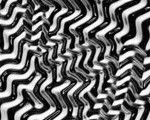Category Science & Technology
Wielding microbe against microbe, beetle defends its food source
As the southern pine beetle moves through the forest boring tunnels inside the bark of trees, it brings with it both a helper and a competitor. The helper is a fungus that the insect plants inside the tunnels as food for its young. But also riding along is a tiny, hitchhiking mite, which likewise carries a fungus for feeding its own larvae.
More experiments needed to advance environmental restoration
Across Wisconsin and the nation, scientists, land managers and conservationists are trying to restore large tracts of wetlands degraded by pollution, sedimentation and invasive plants to a more natural state. Yet while these efforts are laudable, Joy Zedler sees in most of them a missed opportunity.
Engineering students begin water-quality projects in Kenyan village
A group of UW–Madison students who are part of the university's chapter of Engineers Without Borders are working to solve a Kenyan village's water-quality issues.
Canadian science radio producer to visit campus
Jim Handman, executive producer of the highly acclaimed Canadian Broadcasting Corporation science radio show "Quirks & Quarks," will spend the week of Oct. 6-10 on campus as the fall semester University of Wisconsin–Madison Science Writer in Residence.
Conference targets solutions for Yahara Lakes
The woes of the Yahara Lakes are obvious: murky waters, noxious algae blooms, choking weeds. The real question is how best to address these problems.
Lava flows reveal clues to magnetic field reversals
Ancient lava flows are guiding a better understanding of what generates and controls the Earth's magnetic field - and what may drive it to occasionally reverse direction.
Science photo takes second in national contest
With a photograph that embodies the unexpected - and sometimes breathtaking - outcomes of science, University of Wisconsin–Madison graduate student Jenna Eun has won second place in the 2008 Science and Engineering Visualization Challenge, sponsored by the National Science Foundation and Science magazine.
Professor brings sight to people around the world
If you’ve met Suresh Chandra, you’ve likely been enlisted in his crusade to end blindness.
Global population lecture opens Nelson Institute series
Joel Cohen will give a free public lecture, “Global Population and the Global Environment to 2050,” at 7 p.m. Tuesday, Oct. 7, in 165 Bascom Hall. The event opens the fourth year of the Gaylord Nelson Lecture Series, hosted by the Nelson Institute for Environmental Studies. “Population and Resources” is the theme for 2008–09.
University names interim director for Nelson Institute
Gregg Mitman, a science historian at UW–Madison, has been named interim director of the university’s Nelson Institute for Environmental Studies.
Canadian science radio producer named Science Writer in Residence
Jim Handman, executive producer of the highly acclaimed Canadian Broadcasting Corp. science radio show “Quirks & Quarks,” will spend the week of Oct. 6–10 on campus as the fall Science Writer in Residence.
Family medicine increases visibility through YouTube channel
The Department of Family Medicine (DFM) has further broadened its online presence by launching an expanded channel, http://www.youtube.com/WIFamilyMedicine.
Conference targets solutions for lakes
People who care about Dane County’s tainted lakes will consider the options in a daylong conference on Friday, Oct. 10, at Monona Terrace Community and Convention Center.
Q&A: A broad vision for cross-college biology education
As one who balances scientific interests in microbes and climate change with a passion for human development, associate soil science professor Teri Balser knows a thing or two about bridging diverse disciplines and perspectives. Who better, then, to lead the Institute for Cross-College Biology Education?
Study works to improve pain relief in pets
A new, injectable pain-relieving drug formulation for animals might eliminate more than pain.
Comet dust reveals unexpected mixing of solar system
Chemical clues from a comet's halo are challenging common views about the history and evolution of the solar system and showing it may be more mixed-up than previously thought.
Reseachers derive ‘green gasoline’ from plant sugars
Alternative energy doesn't always mean solar or wind power. In fact, the alternative fuels developed by University of Wisconsin–Madison chemical and biological engineering professor James Dumesic look a lot like the gasoline and diesel fuel used in vehicles today.
Monsanto supports UW plant breeding with $1 million fellowship gift
Monsanto Co. has made a $1 million gift to support plant breeding and genetics in the College of Agricultural and Life Sciences (CALS) at the University of Wisconsin–Madison.
Feyzi named new director of Physical Sciences Laboratory
Farshid Feyzi takes over this week as director of the Physical Sciences Laboratory (PSL), the University of Wisconsin–Madison's in-house engineering, manufacturing and project consultation center.







